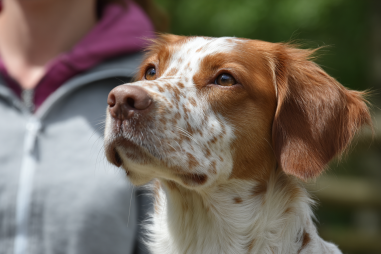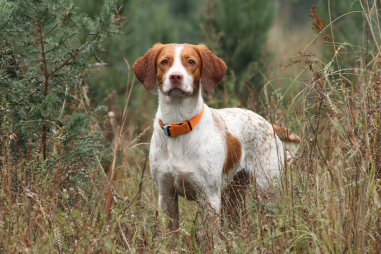Living in an apartment with a high-energy Brittany dog can present its unique set of challenges and rewards. Known for their intelligence, agility, and affectionate nature, Brittanys thrive on activity and companionship, which sometimes seems at odds with apartment living. However, with the right strategies, you can create a fulfilling and healthy environment for your Brittany even within limited spaces. Here’s a detailed guide to help you navigate apartment living with your energetic canine companion.
Assessing Suitability of Apartment Living
Before fully committing to apartment life with your Brittany, it’s crucial to evaluate whether your living situation can meet the needs of this spirited breed. Brittanys are medium-sized dogs known for their high energy levels and need for regular exercise. While apartments typically offer less space than houses with yards, many dogs, including Brittanys, can adapt well with the right lifestyle adjustments.
Consider the size of your apartment and the amenities available. Proximity to parks, dog runs, or walking trails is a significant plus. Also, check your apartment’s pet policy, as some do have restrictions on dog size or breed. Ensure that your building is pet-friendly and that noise regulations won’t create additional stress for you or your dog. If you balance these considerations carefully, apartment living can be a positive experience for your Brittany.
Meeting Exercise Needs Indoors and Outdoors
One of the most important aspects of living with a Brittany in an apartment is satisfying their extensive need for physical and mental exercise. Being a sporting breed, Brittanys love to run, play, and explore. Since outdoor space can be limited in apartments, you’ll need to get creative with exercise routines.
Outdoors, daily walks are essential. Aim for at least two walks per day, each lasting 30 to 60 minutes. Utilize nearby parks or dog-friendly areas where your Brittany can run off-leash safely. If possible, enrolling your dog in agility classes or visiting dog parks regularly can help burn off energy in a social setting.
Indoors, space might feel tight, but activities like fetch down a hallway, tug-of-war, or interactive puzzle toys can keep your dog occupied. Teach your Brittany new tricks or commands to engage their mind and body. Regular indoor play sessions, combined with outdoor time, will help maintain your dog’s physical health and happiness.
Creating a Dog-Friendly Space
Maximizing your apartment’s layout to accommodate your Brittany is key to their comfort. Designate a cozy, safe area where your dog can rest and feel secure. This might include a comfortable bed, blankets, and favorite toys.
Use baby gates if necessary to limit access to certain parts of your apartment, protecting both your dog and your belongings. Provide accessible water bowls and consider placing non-slip mats to prevent slipping on hardwood or tile floors, which can be hard on active dogs during playtime.
Additionally, consider investing in vertical space solutions such as shelves for toys or supplies, keeping the area organized and clutter-free. A well-organized dog space not only fosters good behavior but also helps your Brittany feel at home in a smaller area.
Managing Barking and Separation Anxiety
Brittanys are intelligent and alert dogs but can develop barking habits, especially in apartment settings where noise travels easily and neighbors are close. Unchecked barking can cause disturbances, so managing this behavior early is important.
Training and consistency are your best tools. Teach your dog the “quiet” command and reward them for calm behavior. Provide plenty of physical and mental stimulation to reduce boredom-related barking. If your dog suffers from separation anxiety—which can be common in breeds that form strong bonds—gradually train them to be comfortable alone by using techniques like desensitization and counter-conditioning.
Consider leaving background noise, such as a radio or white noise machine, to mask sounds that might trigger barking. Puzzle toys can also distract your Brittany when you’re away. If anxiety persists, seeking advice from a professional trainer or veterinarian may be beneficial.
Routine and Enrichment Activities
Establishing a consistent daily routine brings stability and security for your Brittany. Regular feeding times, walks, play sessions, and rest help your dog understand what to expect, reducing stress and behavior issues.
Enrichment activities are especially valuable in smaller living spaces. Incorporate puzzle feeders, scent games, or training sessions into the day. Mental stimulation is just as important as physical exercise to keep Brittanys happy.
Rotate toys regularly to keep them interesting, and provide chew toys to satisfy natural chewing urges. Short training breaks throughout the day allow your dog to engage their brain and strengthen your bond.
Community and Neighbor Considerations
Living in an apartment means closer proximity to neighbors, so being mindful of community living is essential when owning a Brittany. Respect building rules regarding leash policies, noise, and waste disposal.
Introduce your dog politely to neighbors if appropriate, which can create a friendly rapport and reduce misunderstandings. Bring your dog under control in shared spaces like hallways and elevators, and always clean up after them promptly.
Having good communication with your neighbors can also help in case noise or behavior concerns arise. Being proactive and courteous fosters a positive environment for both you and your dog, ensuring harmonious apartment living.
Living with a Brittany in an apartment may take some planning and effort, but it is entirely possible to meet their energetic lifestyle with the right approach. By assessing your environment, prioritizing exercise, creating a welcoming space, managing behavior, maintaining a routine, and respecting your community, both you and your dog can thrive together even in smaller quarters. Your Brittany will appreciate your dedication to their wellbeing, resulting in a happy and rewarding companionship.







